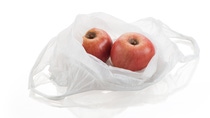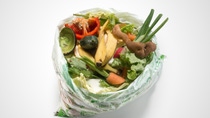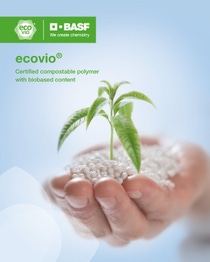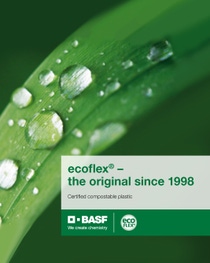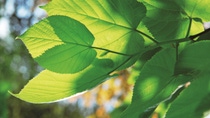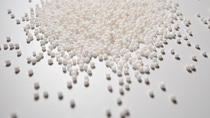• They are certified compostable acc. to EN 13432, ASTM D6400, AS 4736, GBT 41010-2021.
Performance Polymers
Strong and versatile – bags made of certified compostable ecovio® help to close the food loop towards a circular economy
ecovio® is a high-quality and versatile biopolymer from BASF. Its main advantage: it is certified compostable in industrial/commercial or home composting according to infrastructure and legislation in the respective country. ecovio® consists of the certified compostable BASF polymer ecoflex® (PBAT: polybutylene adipate-terephthalat) and polylactic acid (PLA). Bags made of ecovio® are just as high-performing and strong as the ones made of conventional plastics. BASF offers grades with different bio-based content. Thus, ecovio® can be employed to produce a variety of bags that can be processed on conventional machines, used by consumers to transport articles and bring a unique sustainability value when collecting organic waste.
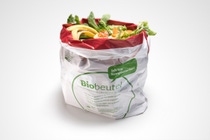
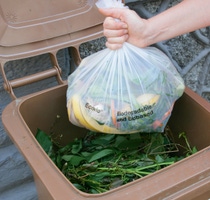
Bags made of ecovio® increase the collection of organic waste
Studies show that bags made of certified compostable ecovio® increase the collection of organic waste and thus help to return valuable food nutrients to the soil by organics recycling. Using compostable plastic materials for products as bags can extend the end-of-life options for these products, especially when they are mixed with kitchen and food waste. The use of ecovio® makes the mixed waste suitable for organic recycling.
This closes the loop towards a circular economy for food production: Food waste is diverted from landfill and incineration, resulting in the creation of valuable compost.
What kind of bags can be made with ecovio®?
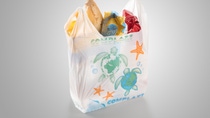

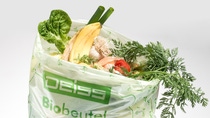
Benefits, applications and end-of-life of bags made of ecovio®:
what are you interested in?
Benefits of ecovio® for bag applications at a glance
Certified compostable bags made of ecovio®: tested and compliant with many organic waste regulations
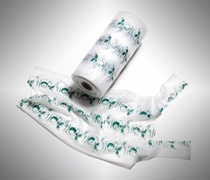
BASF has tested the use and composting of bags made of the bioplastic ecovio® in various conditions in commercial composting projects all over the world. The results show that the bag material biodegrades without any problems in different industrial composting sites, without adversely affecting the quality of the compost. When asked, residents of the respective regions also report positively on the clean and hygienic collection of organic waste. With ecovio®, bags can be manufactured that comply to the latest bio-waste directives, such as the German Bioabfallverordnung (BioAbfV), valid in its latest version as of May 1st, 2023, ASTM D6400, AS 4736 and GBT 41010-2021.
Get the facts and read about pilot project, tests and studies
Discover our biopolymers expertise
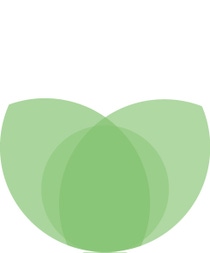
SHOPPING BAGS MADE OF ecovio®: LIGHTWEIGHT, YET STRONG IN USAGE, GOOD FOR COMPOST
Certified compostable shopping bags offer consumers an additional advantage. They are not only strong enough to be used as carrier bags and many times as shopping bags: In their second use, they can be used for the collection of organic household waste where they can biodegrade together with the food waste within weeks either in industrial compost or in home compost, according to the label.
During use, the bags made of ecovio® are just as strong and can bear the same load as the ones made of polyethylene. They can be manufactured with conventional handles or as t-shirt bags.
The product properties are designed in such a way that the bags biodegrade only after usage. BASF offers grades that compost in commercial facilities or in home compost acc. to EN 13432.
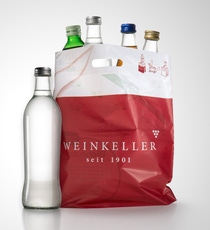
Key technical benefits

• Strong
• Tear resistant
• Puncture resistant
• Moisture resistant
• Printable
• Typical thickness: >40 µm
Watch the video on certified compostable dual-use shopping bags made of ecovio®!

FRUIT AND VEGETABLE BAGS: LONGER SHELF LIFE AND EASIER FOOD WASTE COLLECTION
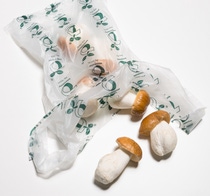
Certified compostable fruit and vegetable bags made of the biopolymer ecovio® are more than simple carrier bags: They can be used to buy fruit and vegetables in a hygienic way, to carry them home safely and to store them. Due to the good breathability of ecovio®, the bags reduce food losses during transport and storage. Re-used as organic waste bags they can improve the collection and recovery rate of organic food waste. Fruit and vegetable bags made of ecovio® can be composted in commercial composting facilities or in home compost according to local organics composting programs.
Thus fruit and vegetable bags made of ecovio® support a cleaner and easier food waste collection and help to close the loop of the food value chain towards a circular economy. BASF validated in several field projects that consumers collect more food waste with compostable watertight plastic bags compared to no-bag availability. They also collect food waste which they do not usually collect, such as fatty, liquid food residues.
Fruit and vegetable bags made of ecovio® also contribute to an extended shelf life of food. As the BASF bioplastic offers high water vapor and oxygen transmission, an optimal humidity and oxygen concentration for different fruit and vegetables in bags can be achieved. A BOKU research report from 2015 shows: Tomatoes stored in bags made of ecovio® have an approximately four times longer shelf life compared to polyethylene bags.
Key technical benefits

• Excellent processability on conventional LDPE blown film lines
• Extrusion up to a thickness of 10-15 μm
• Excellent welding properties
• For mono or multi-layer films
Fruit and vegetable bags made of ecovio® are
- Lighter than paper bags
- Tear and wear resistant
- Approved for food contact
- Available as opaque or transparent films
- Bio-based with 41, 51 or 61% bio-content
- Available without carrier handles as perforated rolls or as t-shirt bags
Suitable grades:
ecovio® 40 FS2331
ecovio® 50 FTS2250
ecovio® 60 FTS2260

ORGANIC WASTE BAGS MADE OF ecovio®: EASY, CLEAN AND SUSTAINABLE COLLECTION OF FOOD SCRAPS
Kitchen food waste can be collected hygienically in organic waste bags made of ecovio®, then turned, together with the bag, into compost – either in commercial composting facilities or in home compost, depending on local legislation.

Key technical benefits

• Clean collection: unpleasant odors in the kitchen are prevented due to ecovio®’s high tear resistance (typical thickness: 15-20 µm).
• No more laborious scrubbing of the organic waste bin or wasting water for washing of the bins: liquids do not leak through due to ecovio®’s high wet strength.
• Fewer misthrows of conventional plastic bags into organic compost where people use certified compostable organic waste bags
• No impact on compost quality
• Certified commercially compostable acc. to acc. to EN 13432 (DINplus Bioabfallbeutel), ASTM D6400, AS 4736, GBT 41010-2021
• Rapid disintegration: certified compostable organic waste bags made of the ecovio® biodegrade completely after four to six weeks in well-managed composting facilities
What requirements should compostable organic waste bags meet?
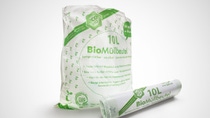
The market offers a wide range of different types of bags for collecting organic waste. Some of them are suitable but the majority do not meet the functionality needs of certified compostable bio-waste bags. In order to be suitable for organic recycling, products and materials need to fulfil the strict criteria of EN 13432 on industrial compostability. Following successful certification, they are permitted to be advertised and labelled as compostable.
Thanks to ecovio®, compostable organic waste bags can fulfill technical as well as compostability requirements:
Suitable grades:
ecovio® 50 FG22C3 / ecovio® 50 FS22C3
ecovio® 50 FG22B2 / ecovio® 50 FS22B2
Watch this video on a community and composting project with certified organic waste bags made of ecovio® in Bad Dürkheim, Germany!
Sustainability benefits of bags made of ecovio®: more organic waste for increased high-quality compost
Compost is a valuable material for soil. It contains organic phosphate which has limited availability and is used for fertilizers. Compost also prevents soil erosion. Several pilot projects show that by using organic waste bags, the amount of organic waste collected separately can be increased – and thus also valuable compost.
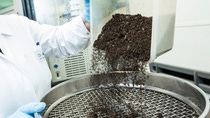
An example:
The European Union aims to divert all organic waste from landfill and incineration. In Europe, only one third of organic waste is collected separately. Even in European countries with a well-developed composting infrastructure, the organic fraction remains the largest part of municipal residual waste. In order to offer citizens a cleaner, safer, and easier collection of organic food waste BASF developed several ecovio® grades for different kinds of bags which help to collect food waste. They are certified for industrial composting or home-composting according to EN 13432, ASTM D6400, AS 4736, GBT 41010-2021.
The multiple use of certified compostable bags made of ecovio® for shopping and then collection of food waste offers many environmental benefits:
Pilot projects, studies and tests: Discover more sustainability benefits of ecovio®!
Watch here how the COOL project in Australia tested certified compostable bags made of ecovio®!
Key advantages of ecovio® for film manufacturers
The ecovio® portfolio for bag applications consists of several grades with the nomenclature F, FG and FTS with different thermal and mechanical properties. They consist of BASF’s certified compostable co-polyester polybutylene adipate terephthalate (PBAT) ecoflex®, other biodegradable polymers made from renewable raw materials and inorganic fillers. All grades are finished products that can be used as a drop-in solution on standard plastic production machinery.
What are the key manufacturing benefits of ecovio® for certified compostable bags?
- Broad processing and melt temperature window
- Excellent down-gauging potential (low film thickness possible)
- Optimal balance of stiffness and toughness
- Adjustable viscosity: from medium to high melt strength
- Tailored film stiffness according to customer requirements
- Excellent sealing strength, comparable to LDPE
- Good mechanical recycling of production waste
Discover more on the extrusion of certified compostable fruit and vegetable bags made of ecovio®!
Key data of ecovio® grades for bags with download links to data sheets
| Grade | Unit | ecovio® F2332 |
ecovio® F2331 | ecovio® F2330 | ecovio® F23B1 /F2341 |
| Thickness | 30 | 12 | 12 | 25 | |
| Bio-content* | % | 16 | 9 | 5 | 9 |
| Certification EN 13432 | ✔ | ✔ | ✔ | ✔ | |
| OK Compost Home | – | ✔ (31 µm) | ✔ (30 µm) | ✔ (24 µm) | |
| Properties** |
|||||
| • Tensile modulus MD/TD | MPa | 330/180 | 220/159 | 150/110 | 260/130 |
| • Tensile strength MD/TD | MPa | 37/39 | 33/28 | 30/16 | 25/25 |
| • Elongation at break MD/TD | % | 540/600 | 300/600 | 300/600 | 480/570 |
| • Tear resistance MD/TD | Nm | 800/550 | 150/500 | 250/470 | 1600/1300 |
| • Dart drop | g | 650 | 280 | 155 | 250 |
| Transparency | +/– | + | ++ | – | |
| Wet strength | ✔ | ✔ | ✔ | ✔ | |
| Processing temperatures | °C | 170-180 | 170-180 | 170-180 | 170-180 |
| Slip / Anti-blocking agent | ✔ / ✔ | ✔ / ✔ | ✔ / ✔ | ✔ / ✔ | |
| Main applications | OWB, CB | F&V | F&V | TB, OWB |
* Bio content is measured according to 14C method as defined by ASTM_D6866-12.
** Typical values, not to be construed as specification, depend on thickness
OWB: Organic waste bag CB: Carrier bag
TB: T-Shirt bag F&V: Fruit and vegetable bag
| Grade | Unit | ecovio® 50 FG22C3 ecovio® 50 FS22C3 |
ecovio® 50 FG22B2 ecovio® 50 FS22B2 |
ecovio® 40 FG2331 ecovio® 40 FS2331 |
ecovio® 50 FTS2250 |
ecovio® 60 FTS2260 |
| Thickness | 20 | 25 | 12 | 12 | 12 | |
| Bio-content* | % | 54 | 51 | 41 | 51 | 61 |
| Certification EN 13432 | ✔ | ✔ | ✔ | ✔ | ✔ | |
| OK Compost Home | – | – | ✔ (30 µm) | ✔ (64 µm) | ✔ (64 µm) | |
| Properties** |
||||||
| • Tensile modulus MD/TD | MPa | 850/350 | 670/300 | 300/150 | 180/150 | 260/130 |
| • Tensile strength MD/TD | MPa | 40/36 | 30/25 | 30/25 | 26/26 | 40/30 |
| • Elongation at break MD/TD | % | 280/420 | 250/450 | 180/500 | 350/500 | 220/580 |
| • Tear resistance MD/TD | mN | 260/300 | 510/500 | 800/300 | 900/1100 | 1000/1200 |
| • Dart drop | g | 350 | 280 | 200 | 115 | 150 |
| Transparency | +/– | – | + | – | – | |
| Mechanical recycling | + | + | + | +/– | +/– | |
| Wet strength | ✔ | ✔ | ✔ | – | – | |
| Processing temperatures | °C | 170-180 | 170-180 | 170-180 | 150-160 | 150-160 |
| Slip / Anti-blocking agent | ✔ / ✔ | ✔ / ✔ | ✔ / ✔ | ✔ / – | ✔ / – | |
| Main applications | OWB | OWB | F&V | F&V | F&V |
* Bio content is measured according to 14C method as defined by ASTM_D6866-12.
** Typical values, not to be construed as specification
OWB: Organic waste bag CB: Carrier bag
TB: T-Shirt bag F&V: Fruit and vegetable bag
Consult with an expert
Self-service solutions:

